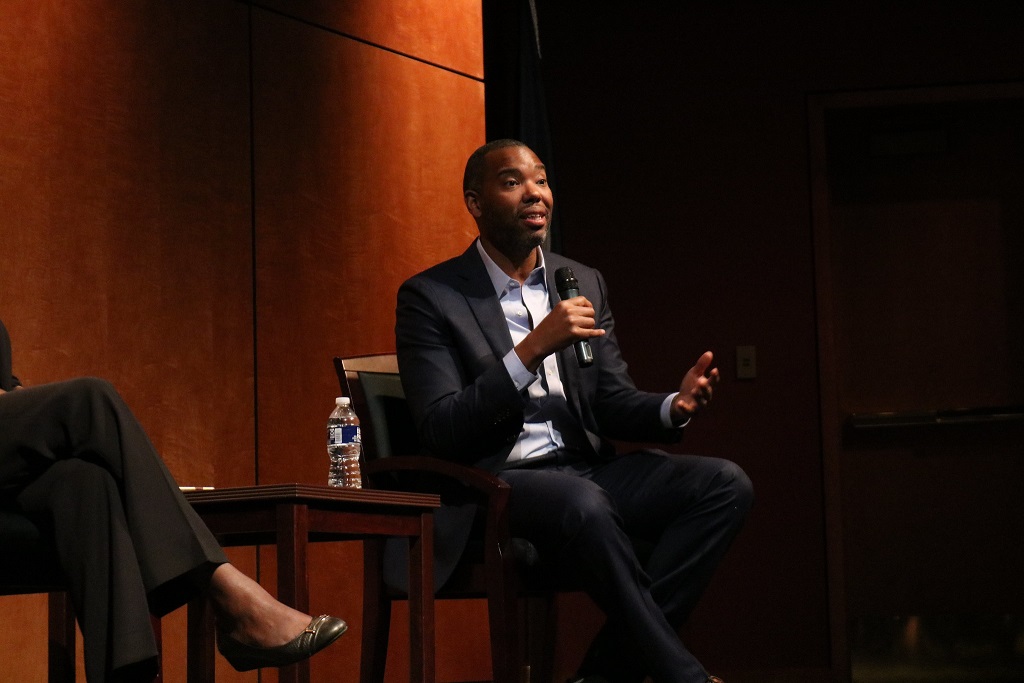Coates, author of new novel The Water Dancer, came to the Virginia Museum of History and Culture to discuss the legacies of emancipation.
Author and Maryland native Ta-Nehisi Coates visited Richmond last week to discuss emancipation and to promote his New York Times bestseller, The Water Dancer. The book is set in Virginia, but his work isn’t the only connection to the Old Dominion. Coates recently found out that one of his ancestors was enslaved outside of Petersburg.
“It’s of special meaning to be here in the capital of the Confederacy,” Coates said.
He pointed out that many can trace their ancestry back to Virginia because of the slave trade. “My story of having my ancestors being from Virginia is actually not that original.”
University of Connecticut professor Manisha Sinha and American Civil War Museum CEO Christy Coleman joined Coates on stage Friday before a sold-out crowd of almost 500 at the Virginia Museum of History and Culture. The evening was part of the museum’s ongoing exhibition “Determined: The 400-Year Struggle for Black Equality.”

The American Civil War Museum co-sponsored the event. The discussion, “Legacies of Emancipation,” examined the history of enslaved African Americans during the 1800s, leading up to emancipation and the shift from enslavement to freedom.
Sinha, who teaches 19th century African American and feminism history, said the emancipation of enslaved African Americans is not just a “singular event, but a process that involves many social actors.”
“When you think about emancipation in that manner, you can actually uncover the efforts of African Americans,” Sinha said.
Coates’ book examines the idea: “What if memory had the power to transport enslaved people to freedom?” Hiram Walker, the main protagonist in The Water Dancer, is an enslaved African American with a superhuman ability, allowing him to travel long distances through water. His powers are only triggered through memories of his mother, who was sold and separated from him when he was a child. According to Coates, the idea of creating a black superhero during the antebellum South was inspired by the “war of aesthetics and beauty” that the Confederate won. He questioned the creation of an “Arthurian Camelot,” a fictional castle and a symbol of King Arthur’s story, that revered and memorialized Confederate Gen. Robert E. Lee.
“On one level, there was a robbery of history, but on another level, it was the idea that somehow fighting for the right to steal labor from people and sell people … should somehow be depicted beautifully,” Coates said.

After an hour-long discussion, the panel took questions from the audience. Virginia Commonwealth University employee and attendee Chante Holt asked what the state should do to combat its high rate of evictions — five Virginia cities are in the top 10 nationally — which disproportionately affects people of color.
Coates responded: “Give them money.” He added that “you are robbing people” if they are taxed equally but only given a “sliver of the same resources.”
Brandy Akins, who works in human resources at Altria, responded to the statement Coates made about the maintenance of power being “deeply tied to forgetting.” “The fact that we don’t remember Reconstruction the way it actually happened is not an accident,” Coates said.
Akins told Coates some people in her social group believe the period before desegregation “sounds like it was better than the situation we’re in now.”
“To not live in that world and to say that this world is worse, I mean, it just looks like you’re spitting on people,” Coates said. “If it was so much better, why would children march in the street; getting sprayed with fire hoses, having dogs sicced on them.”
“The era of segregation was open terrorism,” Coates added.

Afterward, guests explored the exhibit upstairs. “Determined: The 400-Year Struggle for Black Equality” opened June 22, the day Boulevard was renamed in honor of tennis legend Arthur Ashe, and runs through March 29. The exhibit chronicles the black experience from 1619 to the present day through interactive exhibits set in four chronological sections: the Colonial period; American Revolution through the Civil War; Reconstruction through World War II; and the Civil Rights Movement through today.
Holt expressed her gratitude to the museum for the “eye-opening” experience. Akins agreed with Holt, saying Richmond should continue having events and discussions like it. “I loved it,” she said.
Written by Christopher Brown, Capital News Service. Top Photo by Christopher Brown



